
KFC is a worldwide fried chicken franchise. They obviously claim no one can make fried chicken like they do with their secret blend of herbs and spices. Imagine if they were to issue a challenge to produce fried chicken like theirs. What do you think?
In Sura 10:38, we find a similar challenge to prove the authenticity of the Quran.
Or do they say: “He (Muhammad SAW) has forged it?” Say: “Bring then a Surah (chapter) like unto it, and call upon whomsoever you can, besides Allah, if you are truthful!”
Allah is challenging anyone to step up and produce a chapter similar to a chapter in the Quran. Muslims boast that no one has ever met this challenge for 1400 years. They believe the eloquence of the Quran is unmatched.
First of all, eloquence is not evidence of truth. Someone can write a lie very beautifully. No matter how beautiful it is, it still a lie.
Second of all, eloquence is not evidence of divine inspiration. Allah seems to be making this assumption in issuing this challenge.
[Side Note: It is interesting that in the very next Sura, in 11:13, Allah seems to have developed cold feet about his initial challenge because now he asks for ten surahs instead of one! (If the claim was that no one can bring even one, why ask for ten?)
Or they say, “He (Prophet Muhammad SAW) forged it (the Quran).” Say: “Bring you then ten forged Surah (chapters) like unto it, and call whomsoever you can, other than Allah (to your help), if you speak the truth!”]
Think about it. Allah is basically saying, “I can write better than you!” That’s not only embarrassing but a shallow challenge not befitting an omnipotent eternal creator of the universe. Sounds more like an arrogant kid in the school playground!
The argument depends on subjective human judgement. This is not a particularly independent, objective or reliable basis for an argument.
Since there is no clear standard to meet, it is all too easy for apologists to move the goalposts according to their whim and fancies. Depending upon the different opinions of many muslims, the exact meaning of “surah like it” varies greatly. Some say it has to be eloquent and stylish like Quran, some say it must be in Arabic, some say other languages are acceptable, some say the verses should match the exact grammatical rules of Quran, some say verses must have to be meaningful, others say verses should not sound like that of soothsayers or pre-islamic poetry etc. What exactly is the criteria for judging?
The Quran may be distinctive but so are all other books ever written. The distinctiveness of the Quran does not automatically imply a divine origin. Just calling this one book “special” commits the Texas sharpshooter fallacy. All books are unique just like each person is different and unique. You can’t find two people alike. No two fingerprints are alike, no two voices are alike, no two minds are alike, etc.
Can anyone write literature like Shakespeare or compose music like Mozart? Is this evidence of divine inspiration? Anyone can make such claims. If I were to say, “No one can compose songs or sing like me. Therefore, it is proof my inspiration is divine in origin!” Does that make sense? There are many unique, one-of-a-kind, art and sculpture and music and literature and inventions in the world…. Can you produce art like it? Can you produce a sculpture like it? Can you produce music like it? Imagine if the Chinese said, “Can you produce a WALL like it.” 🙂
Let’s say, someone does produce a sura to meet this challenge. What happens next? Who’s going to judge? Obviously, only the author of the Quran is qualified to judge if it is worthy of one of his surahs. Is Allah up for the task?
Muslims will say, “Well, we have judges and jurists who can do it.” Who are they? What are their names? What is their qualification to judge? Are they biased? If this judge already believes that no one can produce a surah, then this whole surah challenge is a sham.
How do you quantify such a challenge? Basically, the challenge seems to be a popularity contest or an opinion poll. If I am the judge, then I will say that these newly composed surahs are better than the Quran. If an Islamist is the judge then, of course, these new verses are blasphemy and nothing but gutter works. So, how are we going to come to a decision?
Besides, claiming that a human is worthy to judge a surah is equivalent to saying this human is equally worthy to judge even the surahs of the Quran! Otherwise, how can he judge any surahs at all? And if this human judge knows the criteria to evaluate and is qualified to judge a surah, then he must be equally capable of producing a surah like it! If he cannot, then he is not qualified to judge any surah.
Coming back to that KFC challenge, who’s going to judge? Of course, the folks at KFC will. It’s their challenge, their rules, and what they say goes. You can cook up the most tender, tastiest chicken and still you will never meet their “standard.” Your chicken may even be more delicious, but sorry, you just don’t have their “secret herbs and spices.”
Allah’s “produce a sura like it” challenge is like this KFC challenge except that KFC in this case would stand for Koran’s Feeble Challenge.
Sura Like It: Challenge Met and Exceeded.
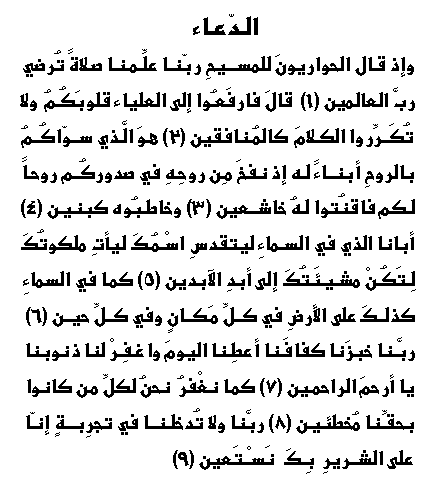
Surat Ad-Du’a (“The Prayer”)
And when the disciples said to Christ:
O our Lord teach us a prayer that pleases the Lord of the worlds. (1)
(wa idh kalal hawari’yoona lil-maseehi rabbana allimna salatan turdee
rabbal alameen)
He said, so lift your hearts toward heaven
and do not reiterate the words (do not be loquacious) like the hypocrites. (2)
(kala farfa’oo ilal alya’ee kuloobakum wala tukarrirul kalama
kalmunafikeen)
It is He who made of you spiritual children for Him
when He breathed into your chests granting you a spirit of your own
so devote yourselves to him with reverence. (3)
(huwal ladhi sawakumu bir-roohi abna’an lahoo idh nafakha min roohihi fi
sudoorikum roohan lakum faknutoo lahu khashi’een)
And address Him as children {do}. (4)
(wakhatiboohu kabaneen)
Our father who art in heaven, hallowed be thy name;
thy kingdom come; thy will be done, for ever and ever. (5)
(abanal ladhi fissamawati liyatakaddas’ismuka, liya’ti malakootuka,
litakun mashee’atuka, ila abadil abideen)
On earth as it is in heaven, at all times and all places. (6)
(kama fissama’ee kadhalika ala ardi fi kulli makanen wafi kulli heen)
O our Lord, our daily bread give us this day
and forgive us our trespasses, O the most merciful. (7)
(Rabbana khubzana kafafana a’tinal yawma waghfer lana dhunoobana
ya arhamar rahimeen.)
As we forgive all of those who trespass against us. (8)
(kama naghfiru nahnoo likulli man kanoo bihakkina mukhti’een)
Our Lord, and lead us not into temptation;
Against the devil thine aid we truly seek. (9)
(Rabbana wala tudkhilna fi tajrubaten inna alashirriri bika nasta’een)
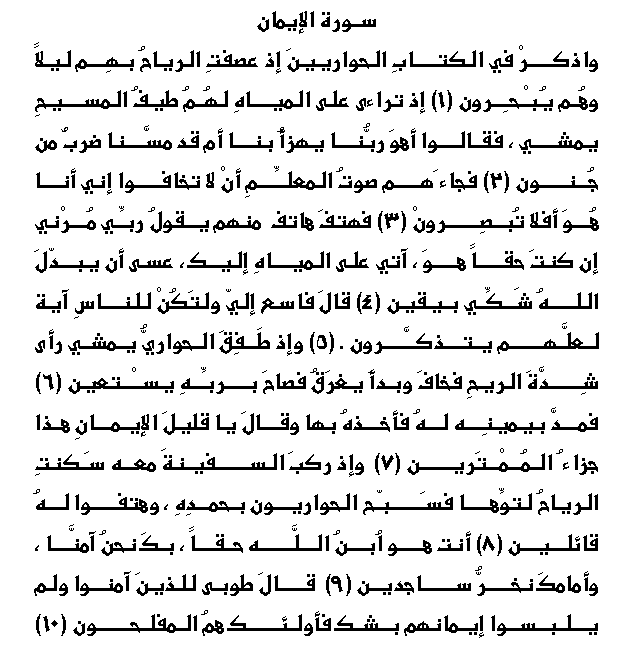
Surat Al-Iman (“Faith”)
And make mention of the disciples in the Book, when the wind blew
while they were sailing at night. (1)
{wadhkur filkitabbil hawari-yeena idha asafatir ri-yahoo bihem
laylan wahum yubhiroon}And then it appeared to them seeing the phantom of Christ walking on the
water. They said: Is He our Lord deriding us or have we gone insane? (2)
{Idh tara'a lahum alal mi-yahee tayful Maseehee yamshee fakaloo
a'huwa rabbuna yahza'oo bina am kad massana tayfun min junoon.}And there came the voice of the Master announcing to them:
Do not fear, It is I, Don’t you see. (3)
{faja'ahumu sawtul-mu'allimi an la takhafoo inni ana huwa
afala tubsiroon?}Hence, one of them shouted and asked: My Lord, order me, if you
were He, to walk toward you on the water, So God may convert my
doubt to certitude. (4)
{fahatafa hatifon minhumu yakooloo rabbi murni in kunta hakkan huwa
atee alal miyahee elayka asa an yubaddilal'lahoo shalli biyakeen}He {The Lord) said to him, come toward me and be a miracle for man
that they may remember. (5)
{kala fas'a elay'ya walitakun linnasi ayatan la'allahumu yatadhakkaroon}And as the disciple began to walk, he saw how strong the wind was
so he became afraid and began to drown. Thus he yelled asking his
lord to help. (6)
{wa'idh tafikal hawari'yoo yamshee ra'a shiddatar'reehi fakhafa
wabada'a yaghrakoo fasa'ha birabbihee yasta'een.}And He {The Lord} extended His hand to him and took him with it and
said: Oh you who has little faith, such is the reward of those who
doubt. (7)
{famadda biyameenihi lahoo fa'akhadhahoo biha wakala ya kalilal
imani hadha jaza'ool mumtareen} And as soon as He went on the ship with him the wind calmed down and
the disciples thanked Him with praise and shouted and said: (8)
{wa idh rakibas safinata ma'ahoo sakanatir riyahoo lita'wiha
fasabbahal hawari'yoona bihamdihee wahatafoo lahoo ka'ileen}You are truly the Son of God; in you we believed and in front of you
we kneel. (9)
{anta huwab'nullahi hakkan fika nahnoo amanna wa'amamka
nakhurroo sajideen}He said: Joy is for those who believed without mixing their faith
with a doubt for those are truly the successful. (10)
{kala tooba lilladheena amanoo walam yulbisoo imanahumu
bishakken fa'oola'ika humul muflihoon}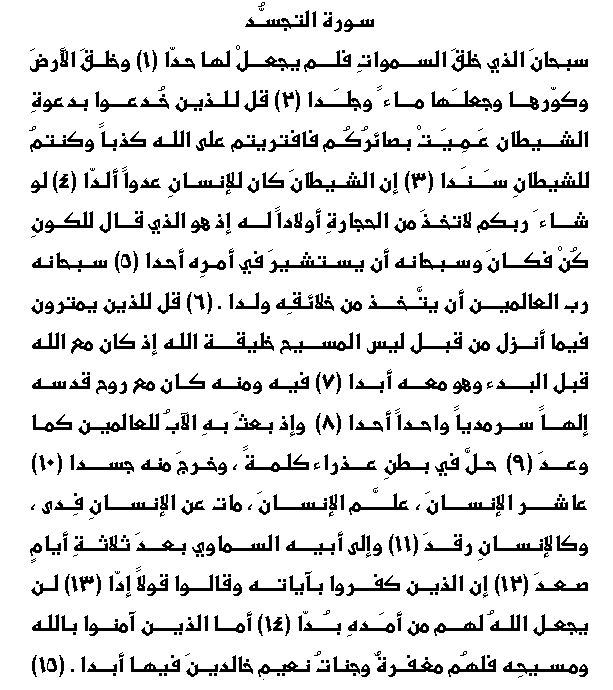
Surat At-Tajassud (“The Incarnation”)
(1) Glorified He who has created heavens for which He did not set a boundary.
(Subhanal lathi* khalakas samawatee falam yaj’al laha hadda.)
(2) He created earth, made it a globe part water and part solid.
(Wa khalakal arda wakaw-waraha waja’alaha ma’an wa jalada.)
(3) Say to those who have been deceived by the call of Satan:
your minds were blinded so you accused God falsly and became
supporters of Satan.
(Kol lilltheena* khoodi’oo bida’wateesh shaytani:
Ameeyat basa’irookom faftaraytumoo alal lahee kathiban* wakuntumoo
lish-shaytani sanada.)
(4) Satan has always been a fierce enemy of man.
(Innash shaytana kana lil’insani adoowan aladda)
(5) If your Lord wished, He would have made children for him out of stones,
as He who has said to the universe: Be, and so it was;
far is it removed from his transcendent majesty
that He should consult anybody in His decisions.
(La’w sha’a rabbukumoo lat-takhatha* minal hijaratee awladan
lahoo Ith* hoowal-lathee* kala lilkawnee kun fakana
wasubhanahoo an yastasheera fee amrihee ahada.)
(6) Far is it removed from his transcendent majesty
that He should take one from his creatures as a son.
(Subahanahoo rabbool allameena an yattakhitha* min khala’ikihee walada.)
(7) Say to those who doubt about what has been revealed before:
Christ is not a creature of God, as He was with God before the beginning
and He is with Him forever.
(Kol lil latheena* yam’taroona fima oonzila min kabloo
laysal masihoo khalikatal lahee Ith* kana ma’al lahee kablal bid’ee,
wahoowa ma’ahoo abada.)
(8) In Him and from Him He was, together with His Holy Spirit,
one God, eternal, one, and no more than one.
(Fihee wa minhoo kana ma’a roohee kudsihee
ilahan sarmadiyan wahidan ahada.)
(9) And as the Father sent Him to the people as He promised.
(Wa ith* ba’atha bihee lil’alameena kama wa’ada.)
(10) He descended as a Word into the womb of a virgin
from which He came out as a body.
(Halla fee batni Athra’a* kalimatan wakharaja minhoo jasada.)
(11) He associated with man, taught man, died as a sacrifice on behalf of man,
and like a man He went to rest.
(Asharal insana, allamal insana, mata anil insani fidan,
wakal’insani rakada.)
(12) And to His heavenly Father, after three days he ascended.
(Wa ila abeehees samawee ba’da thalathatee ayamen sa’ada.)
(13) Those who disbelieved His miracles and said terrible things about Him,
(Inal- latheena* kafaroo bi’ayateehee wakaloo kawlan idda,)
(14) God will not let them escape from his anger.
(Lan yaj’alal llahoo lahomoo min Amadihee boodda.)
(15) But those who believed in Him and His Messiah,
they shall have forgivness and paradise where they shall live forever.
(Ammal latheena* Amanoo billahee wa-Maseehee
falahom Maghfiratun wajannatun Khalideena fiha abada.)
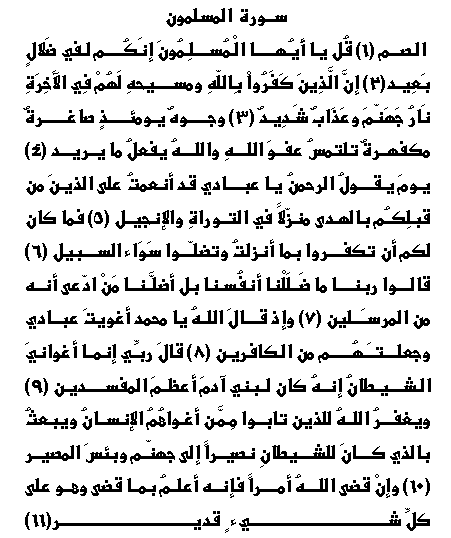
Surat Al-Muslimoon
(1) Alef Lam Saad Meem
(2) Say: O Muslims, You are far astray.
(3) Those who disbelieved in God and his Christ
shall have in the lifeafter the fire of hell
and a severe torture.
(4) Some faces that day will be subdued and darkened
seeking forgiveness from God
and God shall do whatever He wants.
(5) That day, the Most Merciful shall say:
O my servants I favored you with my guidance
revealed to you in the Torah and the Injeel.
(6) And you should have not disbelieved
what I have revealed to you
and go astray from a plain road.
(7) They said: We did not go astray ourselves
but he, who claimed he was one of the messengers (of God)
has mislead us.
(8) And as God says: O Muhammad, you allured my servants
and caused them to become disbelievers.
(9) He said: O my Lord, it is Satan who allured me and truly
he has always been the most corrupting to children of Adam.
(10) And God will forgive those
who have been allured by man and then repented
and he will compel that one who was Satan’s advocate to hell,
a hapless journey’s end.
(11) And if God rules something, He is most knowing of what He rules
and of what He had ruled and He is able to do all things.
(1) Alef Lam Sad Meem
(2) Kul ya ayoohal muslimoona innakom lafee dalalen ba’eed.
(3) Innal latheena kafaroo bil’lahee wa maseehihee lahom fil
akhiratee naroo jahannama wa athabon shadeed.
(4) Wujoohon yawma’ithen saghiraton mukfahirraton taltamisoo
afwal lahee wal’lahoo yaf’aloo ma yureed.
(5) Yawma yakuloor’rahmanoo ya ibadee kad an’amtoo alal’latheena
min kablikom bil’hooda munazalan fit-tawrati wal-injeel.
(6) Fama kana lakom an takfuroo bima anzaltoo wa tadalloo sawa’assabeel.
(7) Kaloo rabbana ma dalalna anfusuna bal adallana manid’da’a annahoo
minal mursaleen.
(8) Wa ith kalal lahoo ya muhammada aghwayta ibadee wa ja’altahom mial
kafireen.
(9) Kala rabbi innama aghwaniyash shaytanoo innahoo kana libanee adama
A’zamal mufsideen.
(10) Wayaghfirool lahoo lillatheena taboo mimman aghwahumool insanoo
wa yab’athoo billathee kana lish’shaytanee naseeran ila jahannama
wabi’sal maseer.
(11) Wa in kadal lahoo amran fainnahoo a’lamoo bima kada wahoowa ala
kulli shay’en kadeer.
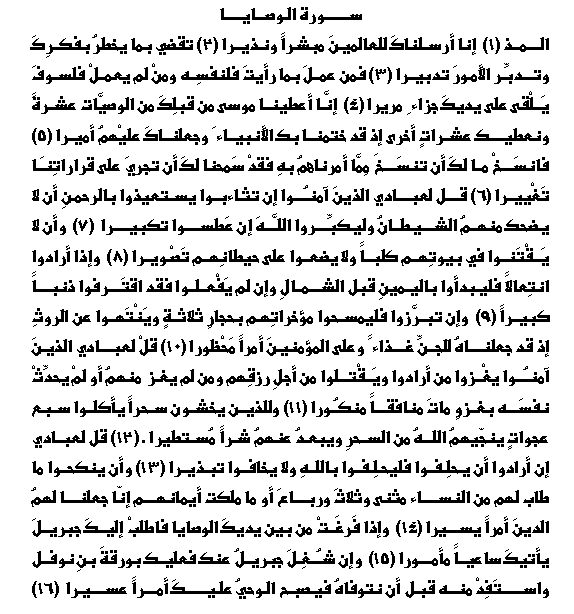
Surat Al-Wasaya (“The Commandments”)
(1) Alef Lam Meem Thal* (th' as inthat’)
{alef lam meem thal}
(2) We have sent you for the worlds a bearer with good tidings and a warner,
{Inna Arsalnaka lil-alameena mubash-shiran wa natheera} (3) (Authorized) to rule with whatever comes on your mind in order to take care of things in the proper manner. {takdee bima yakhturoo bifikrika wa tudabbirool umoora tadbira} (4) He who shall abide by what you rule shall do good for himself and he who shall not shall receive from your hands a bitter reward. {faman amila bima ra’ayta falinafsihee wa man lam ya’mal falasawfa yalka ala yadyka jaza’an mareera} (5) We have given Moses before you ten commandments and We are giving you (many) tens of others as We have made you the last of the prophets and ordained you as a prince over all of them. {inna a’tayna moosa min kablika minal wasi’yatee ashratan wa nou’teeka asharaten ookhra ith kad khatamna bikal
anbiya’a wa ja’alnaka alayhem ameera}
(6) You abrogate whatever you wish to abrogate
of the orders We have given them
for We have allowed you to modify any of our decisions.
{fansakh ma laka an tansakha mimma amarnahumoo bihee fakad
samahna laka an tujri’ya ala kararatina tagh’yeera}
(7) Tell my servants who believe to seek refuge when they yawn
in the Beneficent One to prevent Satan from laughing at them
and to magnify Allah when they sneeze.
{Kul li’ibadial latheena* amanoo in tatha’aboo yasta’eethoo*
bir’rahmanee an la yad’haka minhumoo’sh shayatanoo
wal yukab’birool laha in atasoo takbeera}
(8) (And tell them) not to allow dogs in their homes
and not to put pictures on their walls.
{wa an la yaktanoo fee biyoutihem kalban
wa la yada’oo ala heetanihem tasweera}
(9) And if they want to wear shoes
(tell them) to begin with the right one before the left
and if they do not they surely commit a heinous sin.
{wa itha* aradoon ti’alan falyabda’oo bilyameeni kablash’shimalee
wa in lam yaf’aloo fakadik tarafoo thanban* kabeera}
(10) And when they respond to the call of nature
(tell them) to wipe their rear ends with three rocks
and to avoid using dung for We have made it as food for the Jinn
and as such We made it a prohibited matter for the believers.
{wa in tabarrazoo falyamsahoo mu’akhiratihem bihijaraten thalathaten
wa yantahoo anir-rawthee ith* kad ja’alnahoo liljinni ghitha’an*
wa alal mu’mineena amran mahthoora} (11) Tell my servants who believe to raid whoever they want and even to kill in order to secure their provisions that those amongst them who never raided or never thought about raiding shall die as hypocrites and shall be denied (in the hereafter). {kul li’ibadyal latheena amanoo yaggzoo man aradoo
wa yaktuloo min ajli rizkihem waman lam yaghzoo
aw lam yuhaddethe nafsahoo bighazwen mata munafikan mankoora}
(12) (And tell) those who fear magic to eat seven dates
and Allah shall save them from magic
and keep away from them the evil omen.
{walil latheena* yakhsoona sihran ya’kuloo sab’a ajwaten
yunaj’jihumool lahoo minas’sihree wa yub’idoo
anhumoo sharran mustatira}
(13) Tell my servants if they want to swear
they should swear by Allah as many times as they want.
{kul li’ibadya in aradoo an yahlifoo falyahlifoo billahee
wa la yakhafoo tabtheera} (14) And (tell them) to marry of the women who they see good for themselves, two or three or four, or the captives that their right hands possess, for We have made religion easy for them. {wa an yankahoo ma taba lahumoo minan’nisa’ee, mathnan wa thulatha wa ruba’a aw ma malakat aymanuhumoo inna ja’alna lahumood deena amran yaseera} (15) And when you are short of commandments, call Jibril and he shall come in a hurry as he was ordered. {wa itha faraghat min bayna yadykal wasaya fatlub ilayka jibrila
ya’teeka sa’iyan ma’moora}
(16) And if Jibril is busy go to Waraqa Bin Nawfal
and seek help from him before We take his soul
and then the revelation might become a difficult matter for you.
{wa in shughila jibriloo anka fa alayka biwarqata bni nawfala
wastafed minhoo kabla an natawaffahoo fayusbihal
wah’yoo alayka amran aseera}
References from Sahih Bukhari:
Verse 7 : Look at Hadith 8:242 and 4:509
Verse 8 : Hadith 4.448
Verse 9 : Hadith 1.169
Verse 10 : Hadith 5.200
Verse 12 : Hadith 7.663
Verse 13 : Hadith 3.844
Verse 16 : Hadith 1.3
1 thought on “Produce Chicken Like It”